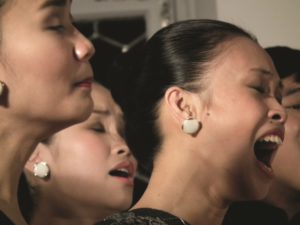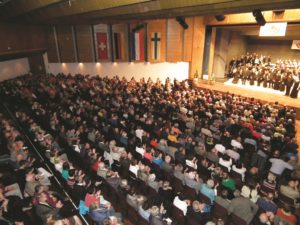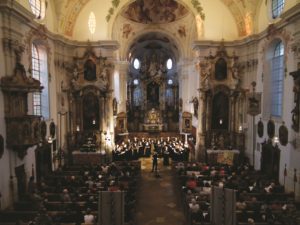By Tim Koeritz, music journalist and singer
Marktoberdorf, a small town on the fringe of the German Alps, is not exactly the centre of the world, but every other year at Pentecost, it does at least become something like the centre of the choral world. This is brought about by the International Chamber Choir Competition Marktoberdorf which this year took place for the thirteenth time, and which also cultivates choral encounters by joint concerts and other events.
Run by the Bundesvereinigung Deutscher Chorverbände (German Board of Choral Associations) it is probably still is the most important and challenging international German competition for chamber choirs, particularly as participants are restricted to the a cappella repertoire, the most difficult aspect of choral singing.

Alongside the KammerChor Saarbrücken and EXtraCHORd from Montabaur, the Finnish chamber choir “Kampin Laulu” from Helsinki and the Serbian Choir Svetozar Markovich from Novi Sad, this year the participants were predominantly university choirs, but also youth choirs with some members above the age of 21. This is the upper age limit for the “real” youth choirs’ category, which had originally been offered but which had had to be cancelled due to too few takers. Nevertheless there were very many young choral singers to be found in Marktoberdorf, for example the members of two national youth choirs, Choeur National des Jeunes de France (this was actually the first time any French choir took part) and the Swiss Youth Choir from Lausanne.
While the French contingent was inspired – primarily through the conducting style of Régine Théodorescu – to an emotiveness that was nearly over the top, with a third prize to show for it, Dominique Tille, one of the two leaders of the Swiss youth choir, by virtue of his most sensitively elegant conducting, managed to keep the sound of his young voices flexible at all times and to imbue the ensemble with a veritably enchanting radiance, at the same time achieving a certain inevitability and naturalness of interpretation. The choir was rightly rewarded for this with a second prize.

It has become a tradition that university choirs represent the USA, and this year was no exception. This time they hailed from Durham (New Hampshire) and Houston (Texas). The Texans convinced throughout with a warm, flexible and balanced basic sound and with this took an unchallengeable lead. A first prize was the least they deserved for this. The University of New Hampshire Chamber Singers, however, disappointed with a permanently rigid sound which felt nearly automatic and did little to inspire; this was clearly the result of William Kempster’s conducting style which prevented a lively flow of sound. The difference was also audible among the individual voices of both choirs, a factor that is always decisive in determining the overall quality of an ensemble and which, for example, allowed the choir from Houston to vary the performance of their madrigal by Claude le Jeune in the most wonderful way by employing different solo groups.
On this occasion, the chaff was most truly separated from the wheat in the exceedingly challenging compulsory work, Max Reger’s Frühlingsblick. This is where the star of the Saarbrückener KammerChor, directed by Georg Grün, really started its ascendency. Wonderful accelerandos and sensitive ritardandos, a glowing sound that flowed in the most romantic manner, provided the basis of a finely shaded sound with superb intonation – and that in Reger’s chromatic labyrinths.

Sadly, it was here that the two university choirs from San Juan (Costa Rica) and Manila (Philippines) did not find the right romantic starting point for their interpretations. The Saarbrückener KammerCHor also offered topnotch standard in its own choice of repertoire. With Györgi Ligeti’s Hälfte des Lebens they offered a work in the first round that could not have been more challenging and difficult, putting the many “soft” contemporary everyday pieces of the other choirs to shame. For this reason, too, the KammerChor Saarbrücken garnered another First Prize.
Translated and printed here with kind permission of Neue Chorzeit, the journal of the Deutscher Chorverband. The article was first published in its June 2013 issue.
Translated from the German by Irene Auerbach, UK

